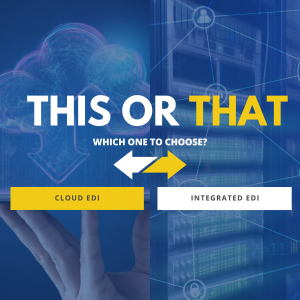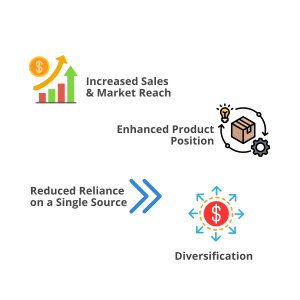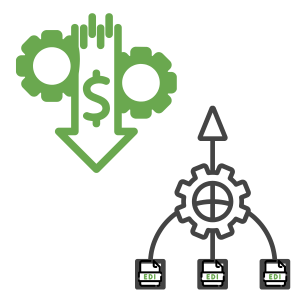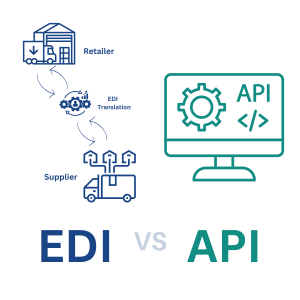What is an EDI Trading Partner?
Before delving into the financial implications, it’s crucial to understand what an EDI trading partner is. Essentially, an EDI trading partner is a business or entity with whom another business exchanges electronic documents, such as purchase orders, invoices, and shipment notices, using standardized EDI formats.
The Risks of Relying on a Single Trading Partner
The devastating impact that can occur when a company puts all its eggs in one trading partner’s basket is unimaginable. The consequences are not only financial but can also have long-lasting effects on a company’s brand image and market position.
Here are some of the risks that could occur,
Relying solely on a single trading partner exposes a company to a multitude of risks. The primary risk is the vulnerability to supply chain disruptions. If the single partner experiences any operational issues, such as production delays, quality control problems, or even bankruptcy, the company is left scrambling to find alternative sources. This can lead to production delays, lost sales, and damaged customer relationships.
Another risk is the lack of negotiation power. When a company has only one trading partner, it loses the leverage that multiple options can provide. The single partner may take advantage of this situation by dictating pricing terms, delivery schedules, and other contractual conditions. This can significantly impact on the company’s profitability and competitiveness in the market.
Furthermore, relying solely on a single trading partner limits the company’s ability to innovate and adapt. Different partners bring diverse perspectives, ideas, and capabilities to the table. Without multiple partners to collaborate with, a company may miss out on valuable opportunities for growth and improvement.
In our recent research at Commport, we found out that many suppliers are just trading with a single trading partner/retailer. Whether it is doing EDI to send and receive transactions or syncing product data with retailers using the GDSN network, suppliers are losing thousands of dollars every day by not diversifying their trading partner network.
There were 3 main reasons why this was happening,
- Suppliers not aware of other trading partners/retailers – Limiting their diversification opportunities
- Suppliers do not know how to connect with multiple trading partners at the same time and what steps are required for the onboarding process for both EDI and GDSN services.
- Suppliers use different EDI vendors for every new trading partner connection without being aware that they can do all of that from a single EDI service provider, by merging all their EDI services into one EDI provider.
Because of any/all of these factors, the suppliers are losing approximately $27K in yearly revenue per trading partner and paying 35% more in EDI costs by dealing with multiple EDI vendors.
This is where the Commport team can help, we have pre-established connections with over 5000+ retailers across the globe. Our team can help you assist and connect with multiple trading partners/retailers that align with your product/services all from one unified interface with a simple onboarding process.
By partnering with Commport, you can leverage our expertise, knowledge, and resources to streamline your EDI operations and effectively manage multiple trading partners. This allows you to focus on your core business while leaving the complexities of data management to the experts.
Benefits of Diversifying Your Trading Partner Network
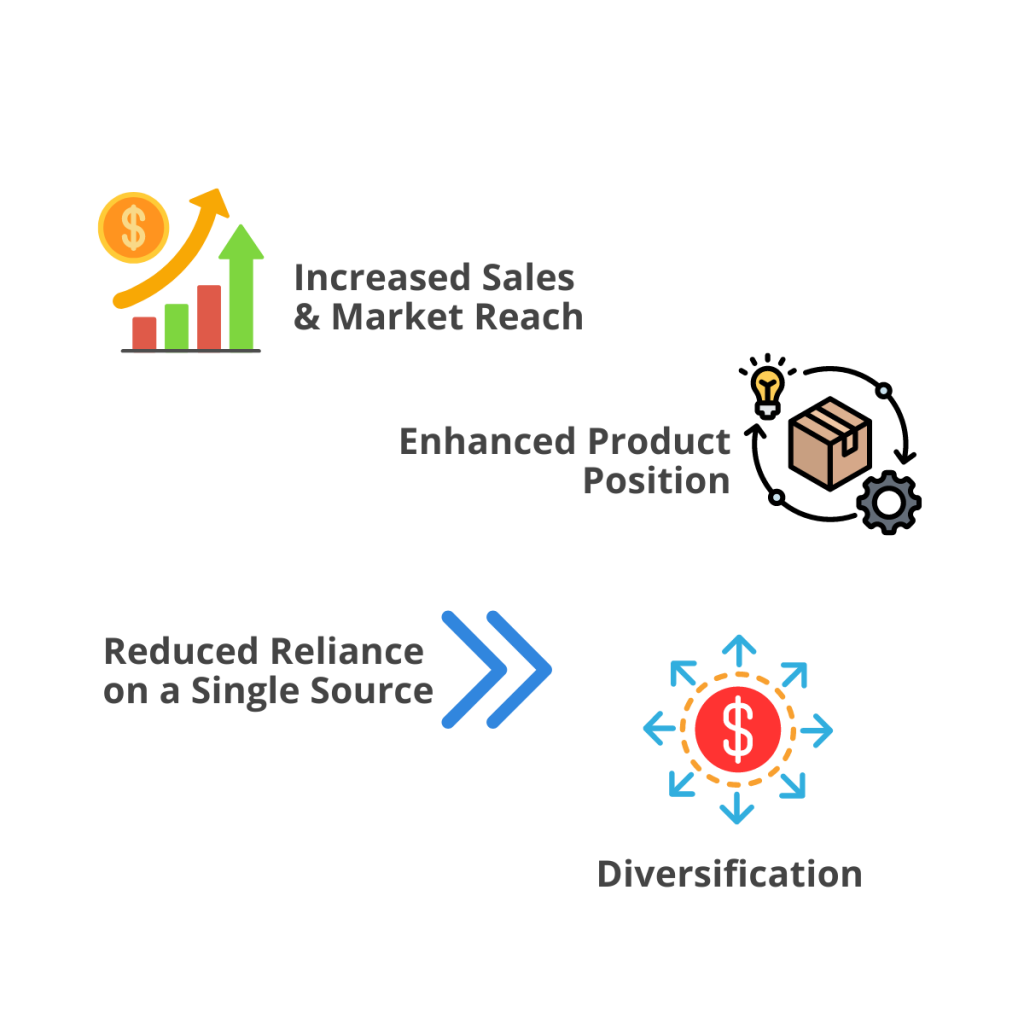
The advantages of venturing beyond a single partner are numerous:
- Increased Sales & Market Reach: Tap into new customer segments and expand your sales potential.
- Enhanced Product Position: A broader network strengthens your product market position with retailers.
- Improved Efficiency & Reduced Costs: Streamlined data exchange minimizes errors and saves time.
- Reduced Reliance on a Single Source: Mitigate risks associated with depending solely on one partner.
- Greater Business Agility: Adapt quickly to changing market demands with a diverse trading network.
Commport New Trading Partner On-Boarding Process
The process of adding new trading partners is smoother than you might think!
Here’s a simplified breakdown:
- Identify Potential Partners: Our team will research your industry and target market to find trading partners/retailers you could benefit from trading with.
- Connect with Commport team members: Discuss your goals and let them recommend compatible partners within their network.
- Partner Agreement & Data Mapping: Finalize a trading agreement with your chosen trading partners, then collaborate with them to ensure seamless data exchange.
- Testing & Go-Live: Once everything is mapped and tested, it’s time to start reaping the rewards of a flourishing network!
Benefits of Choosing Commport as Your Single Source B2B Integration Provider
1. Flexible Connectivity
Provide data translation in many formats using our advanced data mapping and translation engine, supporting many EDI standards and communication protocols. Also, supporting many business verticals from retail, healthcare, logistics, finance, and more.
2. Powerful SAAS-Based Applications
Being SAAS-based applications, it’s easy to set up, deploy, use, and access from anywhere in the world with just an internet connection and computer.
3. Enterprise Integrations
Pre-built library of API connectors to quickly connect to other internal business solutions like ERP systems, and other supply chain solutions.
4. Performance and Reliability
Commport VAN is the #1 VAN network with 99.99% uptime and can easily interconnect globally with all other VAN networks. Enables real-time document exchange ensuring business continuity and process transactions efficiently.
5. World Class Customer Support
Our award-winning and world-class customer support team can assist you throughout the integration journey. Our support team can be reached via email, support tickets, live chat, and phone calls.
6. Self Service Features
Our website hosts tons of free self-service resources from webinars, videos, guides, whitepapers, and many more to help you with more learnings.
Download: EDI Buyers Guide
Unlock the full potential of your supply chain with our comprehensive EDI Buyer's Guide — your first step towards seamless, efficient, and error-free transactions
Conclusion
Relying solely on a single trading partner/retailer is a risky proposition for any business. The hidden dangers and costly consequences of such reliance can lead to supply chain disruptions, loss of negotiation power, missed opportunities for innovation, damaged brand reputation, and more importantly big loss in revenue.
By diversifying their trading partner network, suppliers can mitigate these risks, reap the benefits of multiple options, and build a resilient supply chain that fuels long-term success and growth. Therefore, businesses must prioritize the establishment and management of a diversified retailer network.
Commport Can Help You Connect With Thousands of Retailers Via Our Trading Partner Community
Download: GDSN Buyers Guide
Empower your business with global data synchronization; download our GDSN Buyer's Guide today and take the first step towards streamlined, accurate, and compliant product data management.
Frequently Asked Questions
Engaging with multiple trading partners diversifies your network, expands market reach, fosters collaboration, and mitigates dependency risks.
You can analyze revenue data, market penetration, and missed opportunities to gauge the potential losses incurred by relying solely on a single trading partner.
An EDI service provider offers expertise, resources, and technology solutions to streamline the onboarding process, ensuring seamless integration and communication with multiple trading partners.
Relying on a single EDI trading partner increases dependency risks, limits market diversification, hinders scalability, and exposes businesses to potential disruptions in case of partner-related issues.

